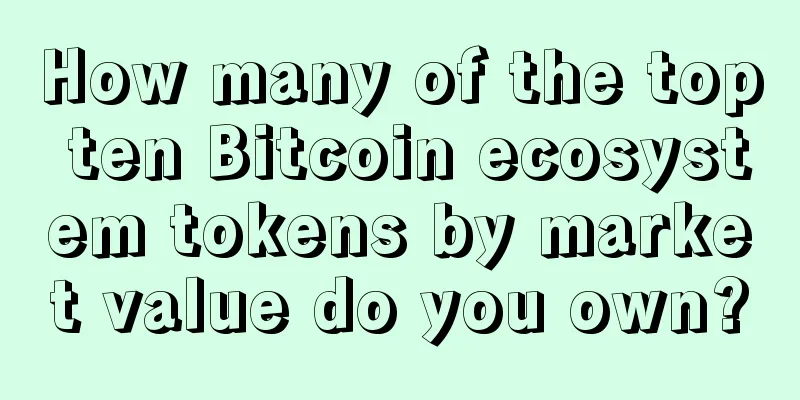Case analysis: Is giving away mining machines for free a crime?

|
Editor’s note: The original title is “Case Study: Giving away mining machines for free is also a crime?!” As the country promotes "new infrastructure", the use of financial technology and digital finance to organize and lead pyramid schemes has become more popular. During this period, some participants believed that as long as they "spread sugar" and "give away mining machines for free" and do not charge money, they would not commit a crime. This idea is naive. Today, we will use a classic mining machine case to help everyone understand the law. Basic factsIn 2016, Zhang and others who were familiar with the field of virtual currency decided to start a business and raise money for "Xingxing Coin". In the early stage, they attracted miners to join by giving away mining machines and coins. The platform gave away mining machines without any fees except registration, which was completely free. In addition to mining with mining machines, veteran miners can also post links to certain star coins through social platforms such as WeChat groups to attract others to register; after others register through the link, the veteran miners can receive commission rewards of certain star coins earned from offline mining by these new miners. New miners who are recommended to join can also receive mining machines and tokens for free; and attract others to register through token links, and obtain commission rewards based on a certain star currency obtained from offline mining. Although the "coins" obtained from mining can be traded with each other for cash, the relevant income can only be withdrawn after the mining machines and tokens are actually purchased offline. JudgementFor the judgment result, please refer to the Judgment No. (2017) Yue 5202 Criminal First Instance 397. The court ruled that the participants in this case were sentenced to fixed-term imprisonment and fined to varying amounts. The core member Zhang received the highest sentence, and was eventually sentenced to: Sentenced to eight years' imprisonment and a fine of RMB 2 million. The other participants were sentenced to prison terms ranging from two years to six years and eight months, and fined between RMB 10,000 and RMB 300,000. Judgment pointsIn this case, the mining machine was obtained completely free of charge; the tokens mined by the mining machine were also obtained completely free of charge. The completely free behavior meets the "four characteristics" of pyramid scheme crimes, and the main consideration is whether the donated mining machines, tokens and other items can generate property benefits. (1) The eligibility and entry fee for joining are not only determined by whether a certain amount of money must be paid upon joining; it also examines whether other funds need to be paid or paid in disguise after free joining. (2) Hierarchy Through the review of the substantial profit standards; if there is a layer of interest relationship, it may be identified as a level of pyramid scheme. (3) Temptation Only the possibility of profit is considered; the statement that there are risks and possible losses does not prevent the establishment of inducement. (4) Group remuneration The standard is property benefits; even if the feedback is in the form of free gifts, it can still be used as the basis for determining remuneration. ControversyFirst, must the entry fee be paid before registration? The entry fee means paying membership fees and entry fees to the organization in order to obtain certain qualifications and status. In this case, registration and entry are completely free, and only the withdrawal process is charged and the team is paid. The remuneration is calculated by collecting fees from others; it can still meet the requirements for the establishment of pyramid schemes. Second, whether giving away mining machines for free constitutes property interests. Free tokens and mining machines can be freely traded and redeemed, and can be identified as property interests. Therefore, the act of giving away coins and candies can be identified as rewarding and tempting behavior. Only when the candies cannot be redeemed at all and are just "playing house" within the system, can the act of giving candies not be identified as property interests. Short conclusionAdding mining machines and issuing coins for free may also constitute a crime. As long as there is an act of paying the team with the investment funds of the downstream, it can constitute the crime of organizing and leading pyramid schemes under Article 224 of the Criminal Law. Link to this article: https://www.8btc.com/media/577640 |
<<: More than 30% of mined BTC is inactive, and exchanges are the largest HODLers
Recommend
Is it good to have a crooked nose?
With the development of real society, we are inse...
Can you tell the gender of your baby by looking at its mouth?
Can you tell the gender of your baby by looking a...
Research | Exploring the potential economic benefits and financial impact of central bank digital currencies
Source: China Social Sciences Today Original titl...
What clues does Litecoin's halving on Thursday provide for Bitcoin's halving?
Key points: Litecoin will have its third halving ...
Do you have a mole that can easily lead to romantic troubles?
Some people like peach blossoms, some people hate...
Is the mole on a woman’s collarbone a sign of wealth? What does a mole on a woman’s clavicle mean?
Traditional physiognomy covers a wide range, among...
What are the characteristics of Kezi's face?
What are the characteristics of Kezi's face? ...
Facial features of wealth, longevity and fame
Facial features of wealth, longevity and fame 1. ...
Bank of Canada: Central bank digital currency will not necessarily exclude Bitcoin, Bitcoin can be widely circulated
Researchers at the Bank of Canada believe that pr...
Analysis of the five lucky and blessed features of women
There are good and bad facial features. Which faci...
Are women with broken palms unlucky in marriage? Are women with broken palms unlucky in marriage?
People usually say that a woman with a broken palm...
Dismissal? Criminal detention? Top star StepN is stuck in legal quagmire
For those who have been paying attention to and i...
Bitcoin Market Report: If Trump wins the US election, Bitcoin trading volume will climb to $92 billion in 2016 (Download the full report)
Juniper Research, a British market research firm,...
Are women with protruding gums mean at heart?
In fact, sometimes it is difficult for us to know...
Is it good for a woman to have a mole on the corner of her mouth? It is easy to attract bad love or unlucky love!
How to interpret the mole on a woman’s mouth? In ...









